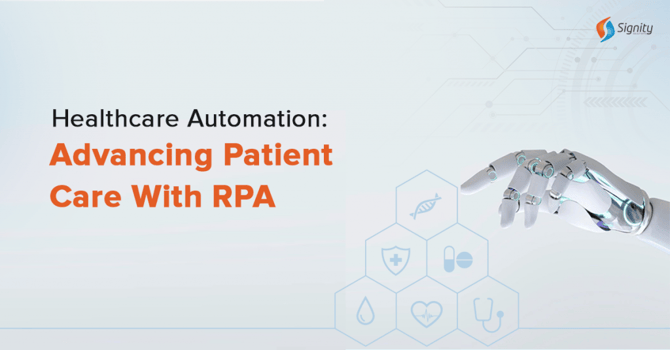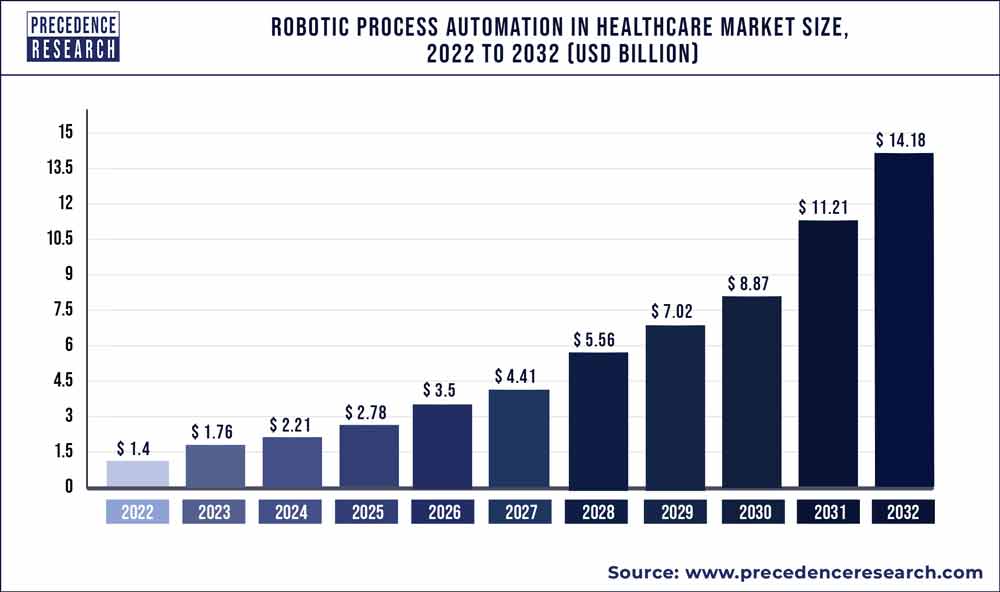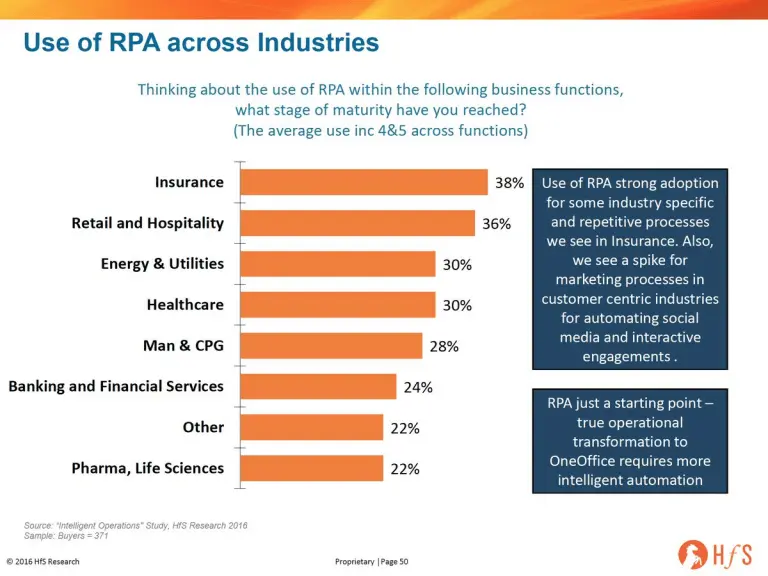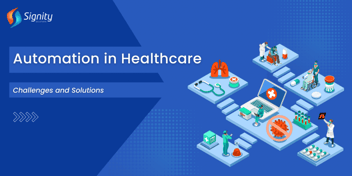RPA In Healthcare: Benefits & Use-Cases in 2024
Explore the transformative impact of Robotic Process Automation (RPA) in healthcare. Discover the benefits and dive into real-world use-cases, showcasing how RPA is revolutionizing processes and enhancing efficiency in the healthcare industry.

The Healthcare industry is overburdened by high costs, incredibly high volume, and strict regulations, due to which the pressures on this industry increase manifold, affecting the quality of healthcare & patient care. RPA in healthcare helps businesses automate healthcare practices, bringing in a lot more benefits!
RPA in healthcare is all the rage now; from individual practitioners to clinics, people are betting on telemedicine and RPA solutions as a permanent solution to the current COVID-19 situation.
In healthcare, many repetitive processes & decisions solely rely on the accuracy of patient data. Patient onboarding & follow-ups, medical billings, and report generation for physicians are some of the repetitive tasks that are common across organizations. These sectors in healthcare are in dire need of healthcare automation.
What is RPA?
Robotic process automation is an automation technology that mimics back-office tasks such as extracting data, filling in forms, and moving files with software help.
The demand for Robotic Process Automation in the healthcare industry is only to rise, with the global market size to top $10.7Bn, at an average CAGR rate of 33.6% over the next seven years. Healthcare, customer service, supply chain management, accounting, human resources & financial services are some areas disrupted by RPA in healthcare.
In the words of UiPath (the leading vendor for RPA tools), ‘Robotic Process Automation is the technology that allows anyone today to configure computer software or a “robot” to emulate and integrate the actions of a human interacting within digital systems to execute a business process.’
Healthcare automation is the need of the hour owing to the challenges in the systems. However, before discussing the RPA benefits and use cases, let’s have a sneak peek at the current state of Healthcare:
The Current Stats of RPA in Healthcare Systems
Coronavirus didn’t create new problems in Healthcare. Instead, it exposed the broken system. Healthcare providers are continuously working to tackle the pitfalls and create an environment where patient care is given due importance & priority.
Over the next 10 years, RPA technology will be most widely adopted in the healthcare sector.
- The global RPA in the healthcare market is projected to reach around USD 14.18 billion by 2032, with an expected CAGR of over 26% from 2023 to 2032.
- 33% of work performed by healthcare providers may be automated.
- 50% of US healthcare providers plan to invest in RPA during the next three years.

- RPA is enhancing the healthcare industry by improving efficiency, reducing operational costs, ensuring compliance with healthcare regulations, and enhancing patient care.
- It is seamlessly integrated with existing healthcare systems, such as electronic health records, billing systems, and appointment scheduling platforms, to facilitate smooth data exchange and interoperability.
- RPA is utilized in various healthcare applications, including claims management, billing, compliance management, appointment scheduling, workflow management, post-treatment care, data analytics, and diagnostics.
- The technology's ability to reduce human error and increase operational efficiency empowers healthcare professionals to focus on delivering quality care and improving patient outcomes.
By leveraging the power of automation and RPA in healthcare, providers can address these issues, making the system more efficient & processes faster.
What Are Top Benefits of RPA in Healthcare?
Let’s briefly outline the benefits of Robotic Process Automation in Healthcare, for that would provide you with a practice-oriented idea about the deployment and application of RPA in Healthcare:
-
Cost Efficiency -
Implementing RPA in healthcare can automate administrative tasks such as appointment scheduling, patient registration, and insurance verification. This automation can help reduce costs associated with manual task handling and allow staff to focus on higher-value activities such as patient care and problem-solving. -
Enhanced Data Security -
RPA is vital for securing patient data by automating processes such as data entry, data processing, and data analysis. RPA systems can help reduce the risk of data breaches and human errors by implementing strict data management protocols, ensuring that patient data is kept confidential and secure. -
Accelerated Processes -
RPA automates tasks, enhancing efficiency and enabling 24/7 operations. This technology can help healthcare organizations accelerate processes such as patient data entry, insurance claims processing, and billing, leading to faster turnaround times and improved patient experiences. -
Data Accuracy and Consistency -
RPA reduces errors from manual data entry, ensuring consistent data quality across healthcare systems. This technology can help healthcare organizations maintain accurate and up-to-date patient records, which can lead to better patient outcomes and improved healthcare delivery. -
Increased Workforce Productivity -
RPA automates tasks, enabling healthcare professionals to spend more time on patient care and problem-solving, maximizing productivity and resource utilization. This technology can help healthcare organizations streamline workflows and free up healthcare professionals to focus on what they do best – caring for patients. -
Regulatory Compliance -
RPA streamlines data tracking and auditing, boosting compliance and governance while reducing regulatory risks. This technology can help healthcare organizations maintain regulatory compliance and reduce the risk of penalties and fines for non-compliance. -
Staff Well-being -
RPA reduces employee burnout by automating data-handling tasks, enhancing job satisfaction, and promoting staff retention. This technology can help healthcare organizations reduce staff turnover rates by improving job satisfaction and reducing the burden of manual task handling. -
Optimal Treatment Decisions -
RPA improves data accuracy, helps physicians make informed decisions, and leads to better patient outcomes. This technology can help healthcare professionals make informed decisions by providing accurate and up-to-date patient data, leading to improved patient outcomes and better healthcare delivery. -
Scalability and Flexibility -
RPA solutions scale easily and adapt to changes in healthcare, ensuring long-term agility. This technology can help healthcare organizations adapt to changes in the healthcare industry, such as new regulations and changing patient needs, by providing a flexible and scalable solution. -
Patient Remote Monitoring -
RPA in healthcare offers many benefits, including higher accuracy and faster processes. In addition, these benefits improve patient record management. And assist healthcare providers in creating a standardized prognosis plan toward desired patients’ health objectives.
RPA technology can help healthcare organizations improve patient outcomes, streamline workflows, and reduce costs, making it an increasingly popular solution in the healthcare industry.
6 Use-Cases of RPA in Healthcare
RPA will transform the healthcare sector- but for the better!
The Healthcare industry is a complex field with a system of interconnected procedures, repetitive tasks, and multiple players across the value chain. The use of RPA in healthcare accounts for almost 30 percent of the total RPA usage.
Robotic Process Automation in Healthcare presents excellent potential for improving and streamlining the efficiency of operational and organizational processes. But its application isn’t just limited to the healthcare sector.
1. Fast-paced Claim Management
Claim management is crucial to the proper functioning of Healthcare institutions. According to the United States Census Bureau, over 90% or almost 294 million people in America are insured. However, setting these claims will have clerical errors that could result in financial pitfalls.
RPA bots can be programmed to identify compliance and non-compliance-related exceptions and regulations, streamlining the entire process of managing insurance claims.
2. Workflow Management
Everyday operations of any healthcare institution involve many mundane yet crucial tasks, including case management, discharge, creating and allocating prescriptions, patient admission, claim processing, release, etc.
Why implement RPA in healthcare to automate everyday business processes?
Medical practitioners, including doctors and nurses, can shift and focus their attention on the patients- something that’s imperative considering the current nCOV Coronavirus Crisis.
3. Patient Remote Monitoring
RPA in healthcare offers many benefits, including higher accuracy and faster processes. In addition, these benefits improve patient record management. And assist healthcare providers in creating a standardized prognosis plan toward desired patients’ health objectives.
4. Improved Care Cycle
This is an extension of the previous point. Continuous remote monitoring with Robotic Process Automation in healthcare generates data that can be levied for an accurate diagnosis.
RPA bots are capable of maintaining and managing all crucial yet mundane tasks. This creates more time for healthcare professionals to attend and deliver better medical solutions to their patients.
5. Regulatory Compliance
RPA bots ensure that everything they do, trigger, track, trace, or document is logged and systematically stored in well-structured logs. As a result, any report during a healthcare audit is necessary for regulatory compliance.
Send these logs to the concerned parties and ensure your practice’s accountability. This event prepares healthcare enterprises to deal with and handle unprepared and sudden external audits (if any).
6. Simplified Appointments
Scheduling and seeing through a complete appointment often includes several complicated (and often implied processes).
For instance, here are the general steps that healthcare practitioners need to follow to schedule a medical appointment:
- Collect Patients’ Basic Information
- Ask for medical history
- Check for a valid insurance policy number
- Align patients’ appointments with the Doctor(s) on-board schedule
- Inform patients/doctors of any changes
An RPA Bot can carry out the said processes quicker and way more efficiently, cutting operational costs and promoting efficiency.
Here, we have curated a list of the few use cases of RPA in healthcare, which are surely going to bring in some disruptive changes:
Closing Words
Implementing new technology does pose potential obstacles, but the benefits far exceed the associated challenges. RPA for healthcare is a win-win situation, for it streamlines the workflow at the doctors’ end while offering superior care to the patients.
RPA is revolutionizing the healthcare sector, thanks to the innumerable benefits such as cost-saving and reduced errors. Consequently, the RPA benefits can be witnessed in all the major industries- manufacturing, retail, data entry, telecommunications, and BFSI.
Having delivered hundreds of RPA services, rest assured that Signity is amongst the top RPA solution providers.
Frequently Asked Questions
Have a question in mind? We are here to answer. If you don’t see your question here, drop us a line at our contact page.
What is RPA in Healthcare?
![]()
RPA in healthcare refers to the use of robotic process automation technology to automate repetitive tasks, streamline workflows, and improve operational efficiency in healthcare settings.
What are the Benefits of RPA in Healthcare?
![]()
The benefits of RPA in healthcare include cost efficiency, enhanced data security, accelerated processes, data accuracy, increased workforce productivity, regulatory compliance, enhanced patient care, staff well-being, optimal treatment decisions, and scalability.
What are Some use cases for Implementing RPA in Healthcare?
![]()
How can RPA Improve Patient Care in Healthcare?
![]()








![12 RPA Use Cases In The Real World [Updated 2024]](https://www.signitysolutions.com/hs-fs/hubfs/Imported_Blog_Media/RPA-Use-Cases-1024x512.png?width=352&name=RPA-Use-Cases-1024x512.png)









